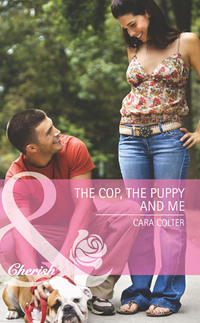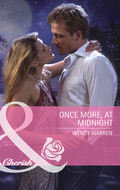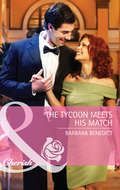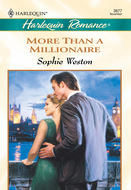Raamatut ei saa failina alla laadida, kuid seda saab lugeda meie rakenduses või veebis.
Loe raamatut: «The Cop, The Puppy And Me»

Sarah told herself it was a hello kind of kiss—a door opening, something beginning between them.
That was what she thought she tasted on his lips: realness and strength and the utter spring freshness of new beginning. When his lips left hers she opened her eyes reluctantly.
He took a step back from her and she read a different truth entirely in his eyes. They were suddenly both shadowed and shuttered.
It hadn’t been hello at all. It had been goodbye.
Then Sullivan straightened and smiled slightly—that cynical my-heart-is-made-of-stone smile.
“Sarah,” he said softly, “you’ve got your hands full trying to save this town. Don’t you even try to save me.”
Then he turned and walked through his open door. He was alone, even though the puppy was with him. He was the gunfighter leaving town. Not needing anyone or anything. Not a woman and not a dog.
Dear Reader,
I am a technophobe. My six-year-old grandson shows me how to use our DVD player. Smartphones make me cringe. I finally have a cellphone, but my message says, ‘Don’t leave a message.’ It’s not because I’m unfriendly! It’s because I leave the phone for days at a time, gathering dust in a corner.
I don’t text or Twitter. My website became glitchy months ago, meaning I can’t update it and I don’t get mail from you. The designer has gone AWOL and I don’t have a clue what to do next!
Imagine my surprise when I discovered I love Facebook. It’s such an immediate, simple and lovely way of having contact with you! Readers helped me name the hero and his two nephews in this story. So please come and join the fun. You can find me at Cara Colter, Author. I can’t wait to hear from you!
With warmest wishes,
Cara
About the Author
CARA COLTER lives on an acreage in British Columbia, with her partner Rob and eleven horses. She has three grown children and a grandson. She is a recent recipient of the Romantic Times Career Achievement Award in the ‘Love and Laughter’ category. Cara loves to hear from readers, and you can contact her or learn more about her through her website: www.cara-colter.com
The Cop, the Puppy and Me
Cara Colter

MILLS & BOON
Before you start reading, why not sign up?
Thank you for downloading this Mills & Boon book. If you want to hear about exclusive discounts, special offers and competitions, sign up to our email newsletter today!
Or simply visit
Mills & Boon emails are completely free to receive and you can unsubscribe at any time via the link in any email we send you.
To Rob (again) who loves me through it all.
CHAPTER ONE
OLIVER SULLIVAN—who had been called only Sullivan for so long he hardly remembered his first name—decided he disliked Sarah McDougall just about as much as he’d ever disliked anyone.
And he’d disliked a lot of people.
Meeting dislikable people was a hazard of choosing law enforcement as a profession, not that Ms. McDougall fell into the criminal category.
“Though I have dealt with criminals who were more charming,” he muttered to himself. Of course, with criminals he had the advantage of having some authority over them.
All this naked dislike, and Sullivan had yet to even speak to her. His encounters had all been filtered through his voice mail. He’d never seen her, let alone met her, and he would have been only too happy to keep it that way.
But she’d gone to his boss.
Her voice on the phone had been enough to stir his dislike of her and her bulldog-like persistence had cemented it.
Not that her voice was grating. It was what she wanted from him that was the problem.
Call me back.
Please.
It’s so important.
We have to talk.
Mr. Sullivan, this is urgent.
When he’d managed to totally ignore her, she’d eventually gone to his boss. Sullivan mulled that over with aggravation. Which was worse? The fact that she had gone to his boss? Or the fact that his boss had ordered him to comply?
At least go talk to her, the chief had said. In case you haven’t figured it out, you’re not in Detroit anymore.
Oh, Sullivan had figured that out. In about his first five minutes on his new job.
Being a cop in small-town Wisconsin was about as different from being a homicide detective in Detroit as Attila the Hun was different from being Mother Theresa.
“What moment of insanity made me choose Kettle Bend, Wisconsin?” he growled.
Of course his moment of insanity had a name, and her name was Della, his older sister, who had discovered this little pocket of American charm and chosen to come here with her orthodontist husband, Jonathon, to raise her two boys. She’d been trying to convince Sullivan to join their happy family ever since his whole life had gone sideways.
Sullivan shook that off, focused on the town instead. He took in the streets around him with a jaundiced eye.
It looked like the kind of town Walt Disney or Norman Rockwell would have imagined, wide, quiet streets, shaded by enormous trees that he, hard-bitten product of some of Detroit’s worst neighborhoods, had no hope of identifying.
Still, there was no missing the newness of the leaves, unfurling in those tender and vibrant shades of spring, the sharp, tangy scent of their newness tickling his nose through his open car window.
Nestled comfortably in the leafy shade were tidy houses, wearing their age and their American flags with equal pride. The houses, for the most part, had a pleasant sameness about them. White with pale yellow trim, or pale yellow with white trim, the odd sage-green and or dove-gray thrown into the mix.
All had deep porches, white picket fences around postage-stamp yards, splashes of spring color in the flower beds lining walkways that welcomed.
But Sullivan refused to be charmed.
He disliked illusions, and he knew this particular illusion to be the most dangerous: that there were places left in the world that were entirely safe and uncomplicated, porch swings and fireflies, cold lemonade on hot summer afternoons.
That there was a place where doors and windows were unlocked, where children rode their bikes unescorted and unafraid to school, where families laughed over board games. That there were places of unsullied innocence, places that whispered the word home. He kept trying to warn Della all was probably not as it appeared.
No, behind the windows and doors of those perfect and pretty houses, Sullivan was willing to bet he would uncover all kinds of secrets that belied the picture he was seeing. Behind some of those closed doors were probably booze bottles hidden down toilet tanks. A kid with a crack problem. Unexplained bruises and black eyes.
It was this cynicism that was making him a poor fit for Kettle Bend.
Certainly a poor fit for Sarah McDougall’s plans for him.
Her message on his voice mail chimed through his head, making him shudder. We need a hero, Mr. Sullivan.
He wasn’t about to be anybody’s hero. This wasn’t how he wanted to be spending his day off. He was about to make one Sarah McDougall very, very sorry she’d gone after this bear in his den.
Checking addresses as he went, Sullivan finally pulled over, stepped out of his car and steeled himself against the sleepy appeal of the street he found himself on. On principle, he rolled up his car window and locked his door. The people of Kettle Bend might want to pretend nothing bad ever happened here, but he wasn’t going to trust his new car stereo to that notion.
Then he turned to look at the house that sat at 1716 Lilac Lane.
The house differed from its neighbors very little. It was a shingle-sided, single-story bungalow, painted recently—white, naturally—the trim a deep, crisp shade of olive. Vines—he guessed ivy because that was the only name of a vine that he knew—showed signs of new growth, and would shade the wide porch completely in the heat of summer.
Sullivan passed through an outrageously squeaking gate and under an arbor that he knew would drip the color and fragrance of climbing roses in a few more weeks.
He shrugged off the relief it was not happening now, as if there was something about all this charm that was nattering away at his defenses—not like a battering ram, more like an irritating humming, like being pestered by mosquitoes. The scent of roses would have been just one more thing to add to it.
Peripherally, he made note that the concrete walkway was heaved in places, but lined with an odd variety of spring flowers—deep purple, with a starburst yellow interior.
He noticed only because that was what he did.
Sullivan noticed everything. Every detail. It made him a great cop. It hadn’t helped him be a better human being, as far as he could tell.
He went up the wide stairs to the front door, crossed the shaded porch to it. Before he rang the bell, he studied the outdoor furnishings.
Old wicker chairs, carefully painted the same olive-green as the house trim, held impossibly cheerful plump cushions, with red and yellow and orange flowers in the pattern. Just as the town painted a picture, so did this porch.
A place of rest. Of comfort. Of safety. Of peace.
“Ha,” Sullivan snorted cynically, but was aware of setting his shoulders more firmly against the buzzing of all the pesky details working at convincing him he could maybe try letting this woman down softly. He could try being a nice guy.
“Ha,” he said again. So far, subtleness had not worked on her. When you phoned a person sixty-two times and they didn’t return your calls that did not mean, Go to the boss.
It meant, Get lost. Go away. Find yourself another hero.
He turned deliberately away from the invitation of the porch, not prepared to admit for even one small moment, a fraction of a second, that he had imagined himself accepting the invitation.
Rest.
He shook his head, and turned to the door, found the bell—a key type that needed to be turned—and twisted it.
The exterior door was a screen door, white with elaborate carvings around the edges framing the oval of the screen in the middle. The green interior door was open, and he could hear the bell echo through the house.
No one answered, but he figured leaving a door hanging open was an invitation, plain and simple, for prying eyes.
So, unlike the invitation to rest, he took this one, peering in at the house.
The door opened directly into the living room, though a handmade rag rug designated a tiny entry area, and suggested the owner liked order—and wiped feet.
Afternoon sunlight spilled through the open door and through the picture window, slanting across wood floors that were golden with the patina of age.
Two small couches, a shade of sunshine-yellow that matched the interior of the flowers that marched up the front walk, faced each other over a scarred antique coffee table. Again, there was a sense of order: neatly stacked magazines and a vase of those flowers that had lined the walkway, dipping low on slender stems.
Sullivan had not formed a mental picture of his stalker.
Now he did. Single. No evidence—and there was always evidence—of a man in residence.
No children, because there was no sign of toys or mess, though his eyes caught on a wall of framed magazine covers, hung gallery-style, just inside that front door.
They were all covers from a magazine called Today’s Baby.
They did nothing to change his initial impression of her. No life.
Sullivan was willing to bet the resident of this house was as frumpy as her house was cute. She was no doubt a few pounds too heavy, with frizzy hair and bad makeup, busy making her house look pretty as a picture while she fell into middle-aged decline.
Now that there was nothing left to do on her house—obviously it was magazine photo shoot ready—she’d turned her attention to the town.
Mr. Sullivan, Kettle Bend needs you!
Yeah, right. Kettle Bend needed Oliver Sullivan the way Oliver Sullivan needed a toothache.
He could smell something faintly, drifting through that open door. The scent was sweet. And tart. Home cooking. The sudden, sharp feeling of yearning took him totally by surprise.
He felt it again, like a whisper along his spine.
Rest.
Again, he shook it off, along with annoying yearnings. He had rested. For a whole year. Tying flies and wearing hip waders. It wasn’t for him. Too much time for thinking.
Sullivan rang the bell again, impatiently this time.
A cat, a gray puffball with evil green eyes slid out of a hallway, plunked itself in the ray of sunshine and regarded him with slitted dislike, before dismissing him with a lift of its paw and a delicate lick. The cat fit his picture of her life exactly.
Still, that cat knew he didn’t like animals.
Which was what made the whole situation that had gotten him to this front door even more irritating. A hero? He didn’t even like dogs. And so he didn’t want to answer the question—not from her and not from the dozens of other reporters and TV stations that were hounding him—why he had risked his life for one.
Sullivan gave the handle of the screen door a firm tug, let the door squeak open a noisy inch or two before releasing it to snap shut again.
Come on. An unlocked door?
It made him feel grim. And determined.
This cozy little world was practically begging for a healthy dose of what he had in abundance.
Cynicism.
He backed off the steps and stood regarding the house.
“She’s in the back. Sarah’s left that rhubarb a bit too long.”
Sullivan started. See? It had gotten to him. His guard had been down just enough not to notice that his every move was being monitored by the next-door-neighbor. She was a wizened gnome, ensconced in a deep Adirondack chair.
From under a tuft of cotton-ball hair, her bright black marble eyes regarded him with amused curiosity rather than the deep suspicion a stranger should be regarded with.
“You’re the new policeman,” she said.
So, he wasn’t a stranger. There was no anonymity in a small town. Not even on your day off, in jeans and a T-shirt.
He nodded, still a little taken aback by how trust was automatically instilled in him just because he was the new cop on the block.
In Detroit, nine times out of ten, the exact opposite had been true, at least in the hard neighborhoods where he had plied his trade.
“Nice thing you did. With that dog.”
Was there one single person on the face of the earth who didn’t know? Sullivan was beginning to hate the expression gone viral more than any other.
She wouldn’t think it was so nice if she knew how often since then he just wished he’d let the damn thing go down the river, raging with spring runoff, instead of jumping in after it.
He thought of it wriggling against him as he lay on the shore of the river afterward, gasping for breath. The puppy, soaked, another layer of freezing on top of his own freezing, had curled up on his exposed skin, right on top of his heart, whimpering and licking him.
Sullivan knew he didn’t really wish that he hadn’t gone in after it. He just wished that he wished it. And that a person with the cell phone had not recorded his leap into the swollen Kettle River and then posted it on the internet where it seemed the whole world had seen it.
“How is the dog?” she asked.
“Still at the vet,” he answered, “but he’s going to be fine.”
“Has anyone claimed him yet”?”
“No.”
“Well, I’m sure there will be a long lineup of people who want to adopt him if his owner doesn’t show up.”
“Oh, yeah,” he agreed.
Because of the video, the Kettle Bend Police Department was fielding a dozen calls a day about that dog.
Sullivan followed the narrow concrete path where it curved around the side of the house and then led him down a passageway between houses. Then the path opened into a long, narrow backyard.
There was no word for it.
Except perhaps enchanting.
For a moment he stood, breathing it all in: waxy leaves; mature trees; curving flower beds whose dark mounding loam met the crisp edge of freshly cut grass.
There was a sense of having entered a grotto, deeply private.
Sacred.
Sullivan snorted at himself, but a little uneasily this time.
He saw her then.
Crouched beside a fence lined with rows of vigorously growing, elephant-eared plants.
She was totally engrossed in what she was doing, yanking at the thin red stalks of the huge-leafed plants.
It must be the rhubarb her neighbor had mentioned.
She already had a stack of it beside her. Her face was hidden in the shade of a broad-brimmed hat, the light catching her mouth, where her tongue was caught between her teeth in concentration.
She was wearing a shapeless flowered tank top and white shorts, smudged with dirt, but the long line of strong legs, already beginning to tan, took his breath away.
As he watched, she tugged vigorously on one of the plants. When the stalk parted with the ground, she nearly catapulted over backward. When she righted herself, she went very still, as if she knew, suddenly, she was not alone.
Without getting up, she pivoted slowly on the heels of her feet and looked at him, her head tilted quizzically, possibly aggrieved that he had caught her in a wrestling match with the plant.
Sarah McDougall, if this was her, was certainly not middle-aged. Or frizzy-haired. She was wearing no makeup at all. The feeling of his breath being taken away was complete.
Corkscrew auburn curls escaped from under the brim of her hat and framed an elfin face. A light scattering of freckles danced across a daintily snubbed nose. Her cheekbones and her chin mirrored that image of delicacy.
But it was her eyes that threatened to undo him. He was good at this: at reading eyes. It was harder than people thought. A liar could look you straight in the face without blinking. A murderer could have eyes that looked as soft as suede, as gentle as a fawn’s.
But eleven years working one of the toughest homicide squads in the world had honed Sullivan’s skills to a point that his sister called him, not without a hint of admiration, scary in his ability to detect what was real about a person.
This woman’s eyes were huge and hazel, and stunningly, slayingly gorgeous.
She was, obviously, the all-American girl. Wholesome. Sweet. Probably ridiculously naive.
Case in point: she left her door unlocked and wanted to make him a hero!
But instead of that fueling his annoyance at her, instead of remembering his fury that she had called his boss, Sullivan felt a surge of foolish protectiveness.
“You should lock your front door when you work back here,” he told her gruffly. Part of him wanted to leave it at that, to turn his back and walk away from her. Because obviously what a girl like that needed to be protected from most was a guy like him.
Who had seen so much darkness it felt as if it had taken up residence inside of him. Darkness that could snuff out the radiance that surrounded her like a halo.
Still, if he left without giving her an opportunity to see that in him, she might pester him, or his boss, endlessly.
So he forced himself to cross the yard until he stood above her, until his shadow passed over the wideness of those eyes.
He rarely shook hands. Keep the barriers up. Establish authority. Don’t invite familiarity. Keep your distance.
So it startled him when he wanted to extend a hand to her.
“Sarah McDougall?” he asked, and at her wide-eyed nod, “I’m Sullivan.”
The aggrieved look faded from her face. She actually looked thrilled! He was glad he had shoved his hand in his pocket instead of holding it out to her.
“Mr. Sullivan,” she said, and scrambled to her feet. “I’m so glad you came. May I call you Oliver?”
“No, you may not. No one calls me Oliver. And it’s not Mister,” he said, his voice deliberately cold. “It’s Officer.”
A touch of wariness tinged her gaze. Hadn’t she been able to tell from her unanswered pleas that he was a man who deserved her wariness?
“No one calls you Oliver?”
What was she asking that question for? Hadn’t he made it eminently clear there was going to be nothing personal between them, not even an invitation to use first names?
“No.” His voice had a bit of a snap to it.
Which she clearly did not recognize, or she would have had the sense to back away from the subject.
“Not even your mother?” She raised a skeptical eyebrow. Her looking skeptical was faintly comical, like a budgie bird trying to look aggressive.
“Dead,” he snapped. He could see sympathy crowding her eyes, and there was no way he was allowing all that softness to spill out and touch him. His mother had died when he was seventeen years old.
And his father.
Seventeen years ago was a place he did not revisit.
There was no sense her misconstruing his reasons for being here, and there was only one way to approach a person like this.
Brutal bluntness.
“Don’t call me anymore,” he said, holding her gaze, his voice deliberately low and flat. “I’m not helping you. Not if you call six million times. I’m not any kind of hero. I don’t want to be your friend. I don’t want to save your town. And don’t call my boss again, either. Because you don’t want me to be your enemy.”
Sullivan saw, astonished at his failure, that his legendary people-reading skills were slightly off-kilter. Because he had thought she would be easily intimidated, that he could make her back down, just like that.
Instead he saw that cute little mouth reset itself in a line that was unmistakably stubborn and that could mean only one thing for him.
Trouble.
Sarah stared up at her unexpected visitor, caught off balance, not just by her tug-of-war with her rhubarb, but also by the fact she’d had a witness to it!
Add to that his unexpected sharpness of tone, his appearance in her yard, his appearance, period, and her feeling of being unbalanced grew.
She’d been totally engrossed in wresting the rhubarb from the ground. Which was what she needed from her house, her yard, her garden and her work.
There was always something that needed to be done, the hard work unending. But her total focus on what she’d been doing had left her vulnerable. Though Sarah suspected that even if you had been expecting this man, had laid out tea things and put on a presentable dress, the feeling you would have when you experienced the rawness of his presence would be one of vulnerability.
The grainy video she had seen—along with millions of other people—had not really prepared her for the reality of him. Though she had already figured out from her unanswered calls that he was not exactly going to be the kind of guy the heroic rescue of a drowning puppy had her wanting him to be.
From thirty seconds of film, from him ripping off his shirt and jumping into the icy water just past where the Kettle River ran under the bridge in downtown Kettle Bend, to lying on the bank after, the pup snuggled into the pebbled flesh of his naked chest, she had jumped to conclusions.
He was courageous. That much was in his eyes. A man afraid of nothing.
But she had thought—a man willing to risk his life for a dog, after all—that he would be gentle and warm.
If his message on his voice mail had been a touch abrupt, she had managed to dismiss that as part of his professional demeanor. But then the fact that he had not returned her increasingly desperate calls?
And now he had been downright rude to her.
Plus, there was nothing warm in those dark eyes. They were cool, assessing. There was a wall so high in them it would be easier to scale Everest.
Sarah felt a quiver of doubt. The reality of Oliver Sullivan versus the fantasy she had been nursing since she had first seen the clip of him did not bode well for her plan, unless he could be tamed, and from looking at him that seemed highly unlikely!
Sullivan was dressed casually, dark denims, a forest-green T-shirt that molded the fullness of his chest, the hard mounds of firm biceps. A hundred other guys in Kettle Bend were wearing the same thing today, but she bet none of them radiated the raw potency that practically shivered in the spring sunshine around him.
He looked like a warrior wearing the disguise of a more civilized man.
He was one of those men who radiated a subtle confidence in his own strength, in his ability to handle whatever came up. It was as if he was ready and waiting for all hell to break loose.
Which was so utterly at odds with the atmosphere in her garden that it might have made her smile, except there was something about the stripping intensity of his expression that made her gulp instead.
Despite astonishing good looks, he had the expression of a man unutterably world-weary, a man who expected the absolute worst from people, and was rarely disappointed.
Still, he was unnervingly good-looking. If she could talk him into doing some TV interviews, the camera would love his dark, chocolate hair, short and neat, slashing brows over eyes so dark brown they could have been mistaken for black. He had a strong nose, good cheekbones, wide sensual lips and a devilish little cleft in his chin.
She could not allow herself the luxury of being intimidated by him.
She just couldn’t.
Kettle Bend needed him.
Not that she wanted to be thinking of him in the same sentence as the word need.
Because he was the kind of man who made a woman aware of things—needs—she was sure she had laid to rest.
He was the kind of man whose masculinity was so potent it could make a woman ache for things she had once had, and had no longer. Fevered kisses. Strong arms. Laughter in the night.
He was the kind of man who could almost make a woman entirely forget the terrible price, the pain that you could invite by looking for those things.
Sarah McDougall didn’t need anyone looking out for her, thank you very much! It was one of the things she prided herself on.
Fierce independence.
Not needing anyone. Not anymore. Not ever again.
Inheriting this house, and her grandmother’s business, Jelly Jeans and Jammies, had allowed her that.
She could not back down from him! So, with more confidence than she felt, in defiance of his hostility, she whipped the gardening glove off her hand, wiped it on her shorts just in case, and extended it to him.
Then she held her breath waiting to see if he would take it.
Tasuta katkend on lõppenud.








